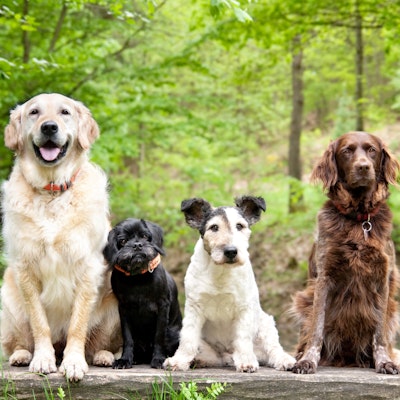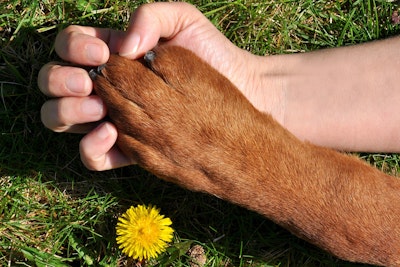

The Mysterious Mind of the Dog
Setup
For years, dogs have been getting the short end of the stick — so to speak — when it comes to research. Dolphins and primates get lots of attention. Now, it’s the dog’s turn. Two experts, Alexandra Horowitz and Brian Hare, are part of a growing number of scientists researching canine cognition. They study what a dog knows, understands, and believes. Sure, it’s nice to know what it means when your pooch wags his tail, licks your face, or stops to sniff. But understanding a dog’s mind is becoming increasingly vital as canines take on more jobs, such as finding bombs, helping people with disabilities, and aiding with search and rescue efforts.
- 2018 Festival
- Science
The early years of domesticated dogs
Humans like to think they had a hand in turning wolves into gentle domesticated creatures. Not so, says canine cognition expert Brian Hare. Wolves were domesticated between 15,000 and 25,000 years ago when humans began living in greater density. “We did what we still do today with great alacrity — produce a lot of garbage.”
It was easy pickings. And dogs were particularly interested in human feces. In fact, excrement played a major role in the domestication of dogs. “Think of human feces as like, an energy bar for a wolf,” says Hare. “It’s cooked, digested, it doesn’t run away, and it has more protein than chicken.”
Bonding with a dog is akin to bonding with a newborn
Don’t stare into the eyes of a wolf, warns dog researcher Alexandra Horowitz. “That’s a threat, but dogs have changed from that.” Dogs love to gaze into the eyes of their owners because they get an oxytocin rush. Oxytocin, the hormone that’s produced to encourage bonding with a newborn, is also present in dogs and humans when they make eye contact.
Big IdeaWe pet dogs and we get this surge of oxytocin. They’ve hitchhiked onto our feelings toward our infants, and they get the oxytocin rush too.Alexandra Horowitz
Do dogs have dreams or nightmares?
If you and your dog watched a horror movie together, can you tell later in the evening if he’s having a nightmare? Scientists say, unfortunately not. It’s tough to measure whether dogs are counting kibble or running from zombies, says canine scientist Brian Hare. We may not know the content of their dreams, he says, but we know sleep is important. Data show dogs that are getting trained perform better after a good night’s sleep.
Big IdeaThe activation that happens at night [for dogs] does help them consolidate memories and learn new things. So, sleep is just as important for dogs as it is for people.Brian Hare
Do dogs feel guilt?
Turns out dogs do experience basic emotions like fear, anger, and pleasure. What’s harder to pinpoint is whether canines feel secondary, or more complex, emotions such as guilt. Alexandra Horowitz, psychology professor at Barnard College, created an experiment to find out.
For her guilt test, Horowitz had dog owners enter a room and forbid their dogs to eat a piece of food, and then owners left. If the dog had consumed the treat upon their return, the owner would scold them. If they left the treat alone, the owner would greet them. "I didn’t see more guilty look when the dog was guilty. What I saw was more guilty look when the owner started getting angry.” Her conclusion: the dog didn’t know they violated the rules of the house but they did understand their owner was angry. “[The guilty look] is an expression of appeasement. ‘I’m concerned you look angry and I want to put on this really cute look.’”
Explore More
Science

Space… the final metaphor for the unknowable. But we are certainly trying to understand what goes on out there, and the more we learn, the more fascinating questions start to...

Since 2014, Aspen Ideas: Health has welcomed nearly 800 inspiring women leaders to our stages to share their bold approaches to better health. In honor of Women's History Mont...

Setting audacious goals helps to redefine what is achievable in health, medicine, and science. As we deepen understanding of the human genome, unravel the mysteries of the bra...


Research on aging and extending life and healthspan has ventured beyond humans to our best animal friends – dogs. In less than a year, dog owners may be able to buy a drug tha...

The recognition that all things are connected is at once a scientific principle and a philosophical touchstone. Humans, animals, and the environment are intertwined in complex...

For as long as humans have looked at the skies, we’ve speculated about whether there is life in space. Scientists, the U.S. military and the CIA have all searched for proof of...

It sounds like sci-fi: Scientists are beaming solar energy from space, subbing seaweed for plastic and brightening clouds to reflect sunlight to lower temperatures in a warmin...

*No food or service animals allowed in this session.* The creator of Fat Bear Week in Alaska gives insight on the importance of wildlife education, and then ecologists unpack...

Scientists are developing life-extending drugs for dogs, and new advancements could bring them to market by 2025. Two leaders working to slow the aging process for Fido discus...

Brain-computer interfaces show potential to restore function to people impacted by incurable neurological conditions such as stroke, spinal cord injury, traumatic brain injury...

Few people are more deeply steeped in science than Francis Collins, former director of the National Institutes of Health and the groundbreaking Human Genome Project, and forme...

Part 1. Contrary to Popular Opinion — Bill Maher in Real Time: The iconoclastic host of HBO’s “Real Time with Bill Maher” sits down with Tina Brown to talk about calling out...

The hormonal changes and hot flashes that accompany menopause are familiar to most women, but the accompanying brain changes have not received as much attention. We now know t...

The idea of gathering DNA samples into a vast database in order to identify disease risks and breakthrough therapies was once a distant dream. Not long ago, immunotherapy seem...

From in vitro fertilization (IVF), which combines human eggs and sperm outside the body, to in vitro gametogenesis (IVG), which uses stem cells to create gametes, pregnancy is...

The communities we call home and the ways we live greatly influence health and longevity. By studying “Blue Zones” around the globe, Dan Buettner has uncovered the macro-level...

The first drug in a class known as GLP-1 agonists was approved in 2005 to treat diabetes. GLP-1 drugs subsequently proved their mettle to treat obesity and prevent major cardi...

Scientific investigation is laser focused on psychedelics to treat post-traumatic stress disorder (PTSD), ease end-of-life anxiety, and address mental health challenges, inclu...

Artificial intelligence is generating enormous excitement for its potential to predict health risks, speed diagnoses, and guide medical decision making. At the same time, the...

The health benefits of a nutritious diet are well-established, but just telling people to eat more plant-based foods and less unhealthy fat isn’t enough to reduce the toll of...












